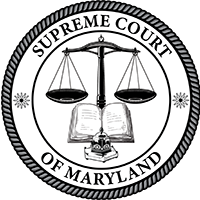SCHEDULE OF ORAL ARGUMENTS
September Term, 2020
Thursday, April 8, 2021:
No. 47 David Esteppe, et al. v. Baltimore City Police Department
Issues – Courts & Judicial Proceedings – 1) Under the first prong of the scope of employment test, does a police officer act in the scope of employment when he performs traditional law enforcement functions with mixed motives? 2) Did CSA err when it declined to rule upon Respondent’s argument that Petitioner should be judicially estopped from arguing that the officer’s motivation was professional when, at the liability trial, Petitioner argued repeatedly that the officer’s motivation was purely personal and the trial court accepted that argument in order to find the officer liable for civil conspiracy?
Attorney for Petitioner: Byron B. Warnken
Attorney for Respondent: Michael Redmond
Friday, April 9, 2021:
AG No. 72 (2019 T.) Attorney Grievance Commission of Maryland v. Thomas McCarthy, Jr.
Attorney for Petitioner: Michael Blow, Jr.
Attorney for Respondent: Thomas McCarthy, Jr.
No. 46 Charles Edward Wallace v. State of Maryland
Issues – Criminal Law – 1) When reviewing whether trial counsel rendered ineffective assistance of counsel, is it proper for a reviewing court to evaluate prejudice by determining whether deficient performance would have been ameliorated had the error been brought to the trial court’s attention? 2) Did CSA err in advising post-conviction courts that the cumulative effect theory – i.e., the theory that prejudice under Strickland v. Washington, 466 U.S. 668 (1984), may be found by considering the collective impact of multiple instances of deficient performance – has “exceedingly narrow” application? 3) Did CSA err in holding that defense counsel’s failure to object to an erroneous instruction on attempted second-degree murder required the reversal of only that conviction, that defense counsel did not prejudice Petitioner when she failed to object to the disclosure to the jury that Petitioner had previously been convicted of a crime of violence, and/or that trial counsel’s failure to object to alleged bad-acts/other-crimes evidence constituted neither deficient performance nor conduct prejudicing Petitioner?
Attorney for Petitioner: Michael T. Torres
Attorney for Respondent: Virginia S. Hovermill
Monday, April 12, 2021:
AG No. 11 Attorney Grievance Commission of Maryland v. Edward Emad Moawad
Attorney for Petitioner: Raymond A. Hein
Attorney for Respondent: Bernard J. DiMuro
No. 49 Town of Riverdale Park v. Mamoun K. Ashkar, et al.
Issues – State Government - 1) Did CSA err in reversing the trial court’s ruling that Respondent had failed to prove that Petitioner’s business decision was pretextual and not based on discrimination? 2) Did CSA err in directing that the case be remanded so that the jury’s verdict could be reinstated, where the trial court expressly ruled that Respondent had failed to prove damages in any non-speculative manner, and where the verdict is, in any event, subject to a statutory cap lower than the amount of the verdict?
Attorney for Petitioner: Kevin Karpinski
Attorneys for Respondent: Timothy F. Maloney and Levi S. Zaslow
No. 40 D'Angelo Wright v. State of Maryland
Issue – Criminal Law – Did the trial court err in giving a flight instruction where the sole contested issue in the case was the identity of the person who committed the crime and fled the scene?
Attorneys for Petitioner: Anne K. Olesen and Anne J. Martin
Attorney for Respondent: Gary E. O'Connor
Tuesday, April 13, 2021:
No. 44 E.N. v. T.R.
Issue – Family Law – When a de facto parentship is formed and fostered at the behest of one legal parent without the knowledge or consent of the other legal parent, does the non-consenting parent retain her superior claim to custody, protected by the substantive component of the Fourteenth Amendment Due Process Clause, against the de facto parent, thereby requiring the de facto parent to prove that the non-consenting parent is unfit or that exceptional circumstances exist?
Attorney for Petitioner: Kenneth E. McPherson
Attorney for Respondent: Tisha S. Hillman
No. 45 Angel Enterprises Limited Partnership, et al. v. Talbot County, Maryland, et al.
Issues – Local Codes – 1) Did the Board of Appeals (“Board”) violate Petitioners’ due process rights by requiring Petitioners to bear the burden of proof (including the burdens of persuasion and going forward with the evidence) to explain Respondent’s basis for its actions and also to disprove the propriety and amount of Respondent’s civil penalties? 2) Did the Board err in imposing penalties on a daily, continuing basis, including for days when no violative conduct occurred, and while Petitioners were exercising their right to challenge Respondent’s allegations and attempt to impose penalties? 3) Did the Board err in finding that Respondent has the legal authority to impose continuing violation penalties where the Express Powers Act limits the County’s ability to impose fines and does not authorize penalties for continuing violations? 4) Did the Board err in determining that the civil penalties imposed by Respondent were stayed upon the filing of Petitioners’ appeal pursuant to Talbot County Code §§ 58-12A(3) and 20-6B(3)? 5) Are the civil penalties sought by Respondent unconstitutionally excessive in violation of the Article 25 of the Maryland Declaration of Rights and the Eighth Amendment to the United States Constitution? 6) Should an appellate court decide an issue of judicial estoppel that occurred during the judicial review period after an administrative decision (and not remand to the administrative body for review)?
Attorney for Petitioner: Mark F. Gabler
Attorney for Respondent: Philip W. Hoon
After April 13, 2021, the Court will recess until May 6, 2021.
SUZANNE C. JOHNSON
CLERK
Pursuant to the February 16, 2021 Amended Administrative Order Expanding Statewide Judiciary Operations in light of the COVID-19 Emergency and the June 18, 2018 Administrative order on the Implementation of Remote Electronic Participation in Judicial Proceedings, and the March 1, 2021 Third Administrative Order on Remote Oral Arguments, the Court will hear oral arguments in these cases by videoconferencing.

